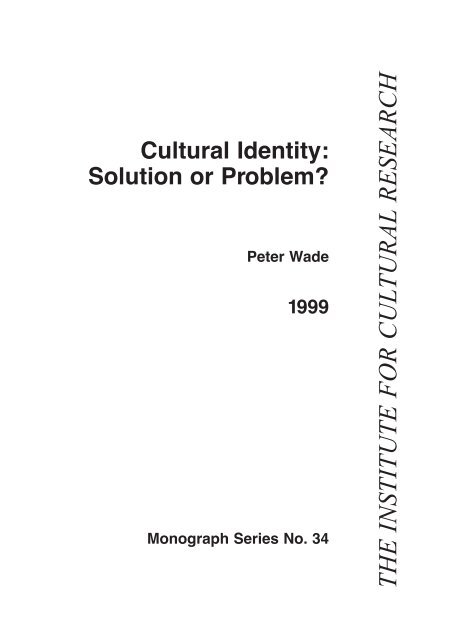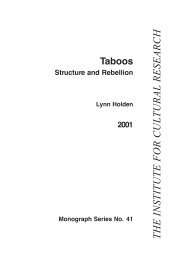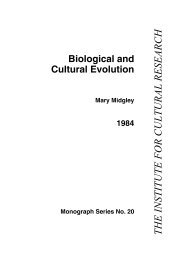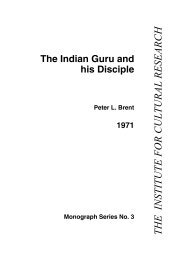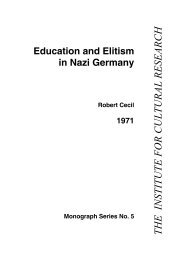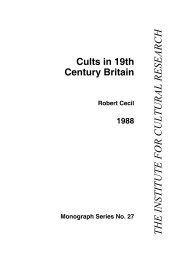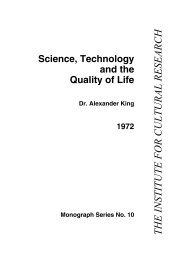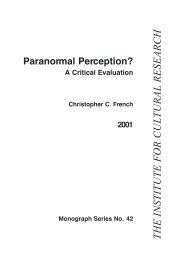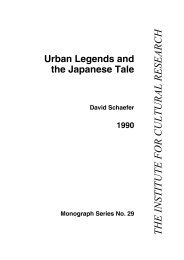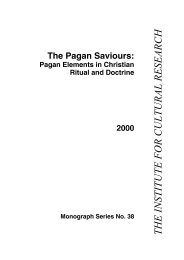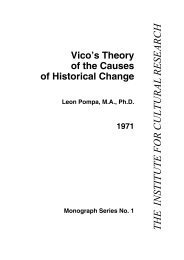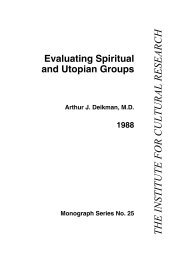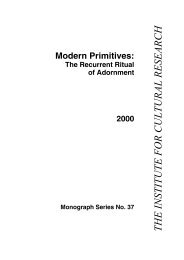Cultural Identity: Solution or Problem - The Institute For Cultural ...
Cultural Identity: Solution or Problem - The Institute For Cultural ...
Cultural Identity: Solution or Problem - The Institute For Cultural ...
Create successful ePaper yourself
Turn your PDF publications into a flip-book with our unique Google optimized e-Paper software.
<strong>Cultural</strong> <strong>Identity</strong>:<br />
<strong>Solution</strong> <strong>or</strong> <strong>Problem</strong>?<br />
Peter Wade<br />
1999<br />
Monograph Series No. 34<br />
THE INSTITUTE FOR CULTURAL RESEARCH
Copyright © 1999 <strong>The</strong> <strong>Institute</strong> f<strong>or</strong> <strong>Cultural</strong> Research<br />
<strong>The</strong> right of <strong>The</strong> <strong>Institute</strong> f<strong>or</strong> <strong>Cultural</strong> Research to be identified as the<br />
owners of this w<strong>or</strong>k has been asserted by them in acc<strong>or</strong>dance with the<br />
Copyright, Designs and Patents Act 1988.<br />
All rights reserved<br />
Copyright throughout the w<strong>or</strong>ld<br />
No part of this publication may be reproduced <strong>or</strong> transmitted in any f<strong>or</strong>m<br />
<strong>or</strong> by any means, electronic, mechanical <strong>or</strong> photographic, by rec<strong>or</strong>ding <strong>or</strong><br />
any inf<strong>or</strong>mation st<strong>or</strong>age <strong>or</strong> retrieval system <strong>or</strong> method now known <strong>or</strong> to be<br />
invented <strong>or</strong> adapted without pri<strong>or</strong> permission obtained in writing from the<br />
publisher, <strong>The</strong> <strong>Institute</strong> f<strong>or</strong> <strong>Cultural</strong> Research, except by a reviewer<br />
quoting brief passages in a review written f<strong>or</strong> inclusion in a journal,<br />
magazine, newspaper <strong>or</strong> broadcast.<br />
Requests f<strong>or</strong> permission to reprint, reproduce, etc. to:<br />
<strong>The</strong> <strong>Institute</strong> f<strong>or</strong> <strong>Cultural</strong> Research, PO Box 2227, London NW2 3BW<br />
Monograph Series No. 34<br />
This version prepared f<strong>or</strong> free download 2006.<br />
<strong>The</strong> <strong>or</strong>iginal hard copy edition:<br />
ISSN 0306 1906 – ISBN 0 904674 26 6 – Published 1999<br />
may be purchased from the address given above, <strong>or</strong> on the ICR website,<br />
www.i-c-r.<strong>or</strong>g.uk<br />
Opinions expressed in monographs published by the <strong>Institute</strong> f<strong>or</strong> <strong>Cultural</strong><br />
Research are to be taken as those of the auth<strong>or</strong>s.<br />
2
THE AUTHOR<br />
Peter Wade did a PhD in Social Anthropology at Cambridge<br />
University, focusing on the black population of Colombia. He was<br />
a Research Fellow at Queensí College Cambridge (1985–1988),<br />
bef<strong>or</strong>e becoming a Lecturer in Geography and Latin American<br />
Studies at the University of Liverpool (1988–1995). He is currently<br />
Profess<strong>or</strong> of Social Anthropology at the University of Manchester.<br />
His publications include Blackness and Race Mixture (Johns<br />
Hopkins University Press, 1993), Race and Ethnicity in Latin<br />
America (Pluto Press, 1997), Music, Race and Nation: Música<br />
Tropical in Colombia (Chicago University Press, 2000), and<br />
Race, Nature and Culture: An Anthropological Perspective (Pluto<br />
Press, 2002).<br />
Note<br />
This paper derives from a presentation at Human <strong>Solution</strong>s:<br />
<strong>Problem</strong> Solving and Society, a seminar given by the <strong>Institute</strong> f<strong>or</strong><br />
<strong>Cultural</strong> Research in January 1998.<br />
3
<strong>Cultural</strong> <strong>Identity</strong>:<br />
<strong>Solution</strong> <strong>or</strong> <strong>Problem</strong>?<br />
Introduction<br />
We are living in an age in which everyone seems to be seeking an<br />
identity. On the one hand, this can be a personal endeavour, a search<br />
to find out who one ‘really is’, how one is made up: this is a<br />
psychoanalytic <strong>or</strong> spiritual quest. On the other hand there is a<br />
search f<strong>or</strong> a cultural identity. This, of course, is connected to a<br />
personal search, but seeks a secure identity in what one has in<br />
common with others, perceived to be like oneself, not what makes<br />
one unique as an individual.<br />
This search f<strong>or</strong> cultural identity is evident in the late twentieth<br />
century in various ways. <strong>The</strong>re has been, above all since the Second<br />
W<strong>or</strong>ld War, a spate of so-called Fourth W<strong>or</strong>ld social movements. 1<br />
Fourth W<strong>or</strong>ld is a term used to refer to the indigenous inhabitants of<br />
areas colonised by Europe who still retain aspects of their <strong>or</strong>iginal<br />
lifestyles. 2 In many areas, such colonised peoples have a very long<br />
hist<strong>or</strong>y of resistance to their oppress<strong>or</strong>s – native American Indians all<br />
over the continent, f<strong>or</strong> example, have rebelled and fought against<br />
domination by European colonisers since the latter first set foot on the<br />
‘New W<strong>or</strong>ld’, although they also adapted to and accommodated their<br />
new masters. Nowadays, however, we can see the emergence of many<br />
indigenous American <strong>or</strong>ganisations which attempt to defend not only<br />
land but also a self-consciously f<strong>or</strong>mulated notion of ‘culture’ <strong>or</strong> way<br />
of life. 3 Equally, it is only really since the 1960s that Australian<br />
Ab<strong>or</strong>igines have begun to <strong>or</strong>ganise in defence of land and culture. 4<br />
This wave of Fourth W<strong>or</strong>ld <strong>or</strong>ganisation – which is in evidence<br />
among tribal peoples in Asia (e.g., Philippines, Thailand,<br />
Bangladesh, India), in the Pacific region (e.g., Melanesia) and in<br />
Africa – is due to a variety of causes. One is the intensification of<br />
resource exploitation in the areas where such peoples live. Of<br />
course, natural resources have been exploited, often in brutal and<br />
destructive ways, in the Australian outback <strong>or</strong> the Amazon region<br />
f<strong>or</strong> centuries, but in the latter half of the twentieth century, such<br />
4
exploitation has tended to penetrate m<strong>or</strong>e decisively into these<br />
areas. Perhaps m<strong>or</strong>e significant, however, has been the wave of<br />
post-war decolonisation in which colonial empires finally broke up,<br />
giving previously dependent peoples a sense of their own destiny<br />
and independence in the w<strong>or</strong>ld. In fact, such decolonisation in some<br />
cases proved troublesome f<strong>or</strong> tribal peoples who found themselves<br />
straddling new national b<strong>or</strong>ders and subjected to attempts at control<br />
from m<strong>or</strong>e than one newly independent government.<br />
But this type of <strong>or</strong>ganisation, seeking redress, rights and a selfconscious<br />
cultural identity is not limited to ‘Fourth W<strong>or</strong>ld’ peoples.<br />
In the USA, black people – <strong>or</strong> African Americans, to use a m<strong>or</strong>e<br />
current term – already had long traditions of <strong>or</strong>ganisation, both<br />
inf<strong>or</strong>mal and f<strong>or</strong>mal. 5 <strong>The</strong> National Association f<strong>or</strong> the<br />
Advancement of Coloured People, f<strong>or</strong> example, was founded in<br />
1909; the United Negro Improvement Association, although<br />
founded in Jamaica by Marcus Garvey in 1914, also had a maj<strong>or</strong><br />
impact in the USA, not to mention the entire Caribbean basin. But it<br />
was the post-war civil rights movement, associated with Martin<br />
Luther King, and the later Black Power movement that had the<br />
greatest influence and also provided models f<strong>or</strong> black consciousness<br />
and struggles against racism and f<strong>or</strong> ‘black pride’ f<strong>or</strong> the<br />
descendants of Africans all over the Americas. Malcolm X became<br />
a hero figure f<strong>or</strong> many black people in Brazil, Colombia and all over<br />
the Caribbean. 6 In the USA, the trend towards ethnic and racial selfconsciousness<br />
was officially recognised in 1970 when the Census<br />
Bureau adopted a categ<strong>or</strong>isation that divided the population into five<br />
basic groups: African, Anglo, Hispanic, Asian and Native.<br />
In the UK, and in much of the rest of Europe, there has also been<br />
a surge of ethnic and racial consciousness and <strong>or</strong>ganisation,<br />
deriving mainly from currents of immigration from f<strong>or</strong>mer colonies<br />
into the metropoli. In the UK, this has resulted in concerns about<br />
cultural identity not only f<strong>or</strong> Afro-Caribbean and Asian immigrants,<br />
but f<strong>or</strong> the British as well (<strong>or</strong> m<strong>or</strong>e precisely the English, Welsh,<br />
Scots and Irish). In some ways fears about immigration – actually,<br />
fears about ‘coloured’ immigration, since a maj<strong>or</strong>ity of Britain’s<br />
post-war immigrants have been white – have channelled concerns<br />
about the decline of Britain as a whole, its loss of w<strong>or</strong>ld power,<br />
its decline as an imperial nation, its possible abs<strong>or</strong>ption into<br />
Europe and so on. Gilroy (1987, 1993) argues that this sense of<br />
5
crisis is ‘lived’ through ideas about the ‘problems’ caused by<br />
racial min<strong>or</strong>ities.<br />
Why is this search f<strong>or</strong> cultural identity happening now? <strong>The</strong>re<br />
are many reasons f<strong>or</strong> this post-war phenomenon. 7 First, there has<br />
been a gradual challenge to the security of Western f<strong>or</strong>ms of<br />
knowledge: science and the ‘progress’ it is said to bring have been<br />
opened to increasing doubt from both epistemological and<br />
ecological points of view. <strong>The</strong> certainty of scientific knowledge, of<br />
course, has been questioned f<strong>or</strong> a long time, by such as<br />
Wittgenstein and Nietzsche, but this element of doubt has<br />
strengthened with m<strong>or</strong>e recent hist<strong>or</strong>ical approaches to science<br />
which seem to indicate that scientists to some extent ‘construct’<br />
their knowledge rather than simply discover it. 8 Of course, such<br />
knowledge may ‘w<strong>or</strong>k’ effectively at very high levels of resolution,<br />
enabling missiles to fly and atoms to be split, but this does not mean<br />
it is necessarily ‘true’ in some absolute, complete and permanent<br />
way. This whole trend may seem to have a tenuous link with the<br />
emergence of a widespread search f<strong>or</strong> cultural identities, but the<br />
point is that it is part of a general challenge to the auth<strong>or</strong>ity of<br />
Western modes of knowing, planning and progressing. <strong>The</strong>se<br />
modes, to which science is central, have in a very general sense<br />
envisaged the march of modernisation as a process which will lead<br />
to the global dominance of Western-style rationally planned,<br />
democratic and capitalist societies in which traditional ethnic and<br />
racial identities wither away. <strong>The</strong> questioning of science itself<br />
removes one strut from under the edifice of this vision and opens<br />
the way to seeing cultural identities as imp<strong>or</strong>tant, viable and<br />
modern f<strong>or</strong>ms of living.<br />
Second, the processes of decolonisation to which I referred<br />
above also challenged the centrality of Western knowledge and<br />
power. Whereas Europe and, m<strong>or</strong>e recently, the USA had seemed to<br />
be the masters of a global empire that encompassed not only<br />
economic exchange, but also m<strong>or</strong>al values, standards of lifestyles<br />
and taste, decolonisation w<strong>or</strong>ked to undermine this image of power.<br />
Of course, economically the USA and Europe (but now also Japan)<br />
do continue to dominate the globe, but post-colonial writers and<br />
artists have mounted a maj<strong>or</strong> challenge to the imperium of taste and<br />
value. Such a challenge is riven with problems about <strong>or</strong>iginality and<br />
imitation – to what extent are intellectuals and artists from the post-<br />
6
colonies simply producing imitations of Euro-American <strong>or</strong>iginals,<br />
rather than producing something ‘new’ – but the challenge itself is<br />
unmistakable. It is in this context that anti-racism has flourished, as<br />
racism itself is seen to be a product of Euro-American colonial and<br />
neo-colonial domination of the rest of the w<strong>or</strong>ld.<br />
Third, some of the identities that people previously felt to be<br />
secure and that they took f<strong>or</strong> granted have been disturbed by recent<br />
trends in the<strong>or</strong>y and political practice. Part of this is the result of<br />
decolonisation itself, which upset identities such as ruler/ruled.<br />
Feminism has also played an imp<strong>or</strong>tant role here. Feminists explicitly<br />
set out to challenge what it meant to be ‘female’ <strong>or</strong> ‘male’. <strong>The</strong>y<br />
sought to show, often using examples from non-Western cultures,<br />
that Western ideas of female and male were not ‘natural’ but<br />
hist<strong>or</strong>ically particular. It was not inevitable that men should be ‘on<br />
top’, <strong>or</strong> that they should be aggressive, dominant and <strong>or</strong>iented to the<br />
public domain, while women were tied to the domestic domain,<br />
weaker than men, dependent and ‘naturally’ linked to caring and<br />
nurturing roles. In other societies, women might be in charge of<br />
heavy agricultural labour outside the home, <strong>or</strong> men and women<br />
might see each other as linked in relations of egalitarian<br />
complementarity, rather than hierarchy. Feminism itself felt the<br />
impact of searches f<strong>or</strong> cultural identity, as black women, in Britain<br />
and the USA, f<strong>or</strong> example, started to question the way feminist<br />
agendas seemed to be set by middle-class white women who, they<br />
argued, did not always grasp the way things looked from the point of<br />
view of ethnic min<strong>or</strong>ity women, who suffered not only sexism, but<br />
also racism.<br />
Fourth, although the human w<strong>or</strong>ld has always been<br />
interconnected by circuits of migration and exchange that stretch<br />
around the globe, in the twentieth century, the process of<br />
‘globalisation’ has intensified greatly, mainly due to the<br />
communications technology that allows people, money, goods,<br />
images and ideas to circulate with great freedom and rapidity. <strong>The</strong><br />
chief driver of this process is, of course, capitalism which develops<br />
and uses these technologies in the permanent search f<strong>or</strong> profits.<br />
This search has been a maj<strong>or</strong> spur f<strong>or</strong> the economies of the West f<strong>or</strong><br />
centuries, leading to the exploitation of the Americas, Africa and<br />
huge regions of Asia. Nowadays, the w<strong>or</strong>ld is indeed the oyster of<br />
modern multinational companies who can exploit cheap labour and<br />
7
esources in virtually any c<strong>or</strong>ner of the globe and can invest, and<br />
disinvest, billions of dollars in almost any national economy at the<br />
drop of a hat. This global movement of things and symbols has<br />
blurred national boundaries to some extent and created a degree of<br />
cultural standardisation – the so-called McDonaldsisation of the<br />
w<strong>or</strong>ld. In this context, local identities seem to break loose from<br />
their mo<strong>or</strong>ings: Durham mining communities collapse,<br />
economically and culturally, as Britain imp<strong>or</strong>ts cheaper coal from<br />
Australia; African past<strong>or</strong>alist tribesmen buy Armani suits and play<br />
video games. 9 Cultures become ‘deterrit<strong>or</strong>ialised’ (Appadurai 1991)<br />
as the overlapping of people, property and places becomes less<br />
stable. However, in this context, local cultural identities do not<br />
disappear. In the face of this destabilisation, people try to secure a<br />
new identity, whether local, ethnic, racial <strong>or</strong> national. <strong>The</strong>y do so<br />
using the various resources at their disposal, which may be of<br />
strictly local <strong>or</strong>igin <strong>or</strong> m<strong>or</strong>e likely derived from the very circuits of<br />
global exchange that are destabilising the older certainties.<br />
All this sketches out the basic theme that I am addressing in this<br />
essay. People are faced with various problems – how to achieve a<br />
sense of identity and ‘home’; how to secure land rights <strong>or</strong> human<br />
rights (including a right to be different from the maj<strong>or</strong>ity and yet<br />
not be discriminated against f<strong>or</strong> it). To solve these problems they<br />
use the notion of ‘cultural identity’ as a self-conscious f<strong>or</strong>mulation<br />
with which to represent themselves, to locate themselves and<br />
struggle f<strong>or</strong> the end they seek to achieve. ‘This is who we are’, they<br />
can say, ‘this is our hist<strong>or</strong>y and culture’.<br />
But is this a good solution? Or does it bring as many problems as<br />
it seems to solve? Is there a better way? To answer this, we need to<br />
look at what ‘cultural identity’ is, where the notion came from and<br />
how it has developed as an idea. This in turn means looking at how<br />
the ‘experts’ (in this case, social scientists and academics of the<br />
arts) have approached the concept of ‘culture’ and the ways in<br />
which they tried to solve the problem of how people w<strong>or</strong>k as<br />
cultural animals.<br />
<strong>The</strong> hist<strong>or</strong>y of ‘culture’<br />
‘Culture’ is a w<strong>or</strong>d with a very complex hist<strong>or</strong>y. 10 It derives from the<br />
Latin w<strong>or</strong>d f<strong>or</strong> ‘cultivate’ and in this sense it passed into English in<br />
about the fifteenth century as a w<strong>or</strong>d to express tending, husbanding<br />
8
and cultivating. Between the sixteenth and eighteenth centuries, it<br />
acquired the connotation of cultivating, educating and improving the<br />
mind. Here is the root of the idea of culture as elite, ‘advanced’<br />
artistic f<strong>or</strong>ms, the product of extensive ‘cultivation’. From this<br />
notion of improvement there gradually derived the idea of culture as<br />
an abstract process of human cognition <strong>or</strong> the products of that<br />
process; culture here was a human faculty, it was what made humans<br />
human. This is the root of the (modern) late nineteenth-century<br />
sociological and anthropological use of the term. F<strong>or</strong> example,<br />
culture was defined by E.B.Tyl<strong>or</strong> (sometimes labelled ‘the father of<br />
anthropology’) as the sum total of activities of humans: ‘the complex<br />
whole which includes knowledge, belief, art, m<strong>or</strong>als, law, custom<br />
and any other capabilities and habits acquired by man as a member<br />
of society’. However, these complex wholes were seen as arranged<br />
on a ladder in which some people were m<strong>or</strong>e advanced culturally, <strong>or</strong><br />
‘civilised’, than others. Culture was seen as a process of human<br />
development <strong>or</strong> evolution over time and all the founders of social<br />
science were interested in human hist<strong>or</strong>y as a process of steady<br />
improvement and approach to the ‘civilised’ state (of which, not<br />
surprisingly, they considered European society to be the exponent).<br />
Human hist<strong>or</strong>y was the hist<strong>or</strong>y of culture as a s<strong>or</strong>t of ladder with<br />
‘savages’ and ‘barbarians’ at the bottom and civilised Europeans at<br />
the top. Some people had got ‘stuck’ on the ladder and these were the<br />
‘less civilised’ peoples. <strong>The</strong>re were various explanations f<strong>or</strong> why<br />
they had got stuck, ranging from environmental fact<strong>or</strong>s (the tropics<br />
debilitated people) to ‘racial’ (some ‘races’ were biologically inferi<strong>or</strong><br />
to others). F<strong>or</strong> all these scholars, culture was essentially used in the<br />
singular; hence E.B.Tyl<strong>or</strong>’s classic w<strong>or</strong>k was titled Primitive Culture<br />
(1871), not ‘Primitive Cultures’.<br />
<strong>The</strong>re is also a different current of usage of the w<strong>or</strong>d culture<br />
which goes back to the late eighteenth century. This is the idea of<br />
cultures, in the plural: various cultural units, located in specific<br />
geographical areas. <strong>The</strong> pluralist notion developed partly during the<br />
Romantic movement with the idea of folk and traditional cultures.<br />
<strong>The</strong>se cultures were identified as the authentic roots of national<br />
traditions and this linked the notion to two developments: i) the<br />
spread of nationalism in Europe and the search f<strong>or</strong> authentic<br />
national identities which defined each nation as unique and<br />
distinctive; ii) the Romantic search f<strong>or</strong> unsullied traditional<br />
9
community values in the face of alienating industrialism and<br />
modernity. (We can see here that the things that spur the search f<strong>or</strong><br />
identity today – a quest f<strong>or</strong> a feeling of being ‘at home’ in the face<br />
of destabilising modernity – actually have deep roots.)<br />
This pluralist meaning of culture was developed in anthropology<br />
by the German-American scholar Franz Boas and it is the meaning<br />
that came to dominate anthropology (and also sociology and other<br />
social sciences and humanities). Franz Boas was part of a wider<br />
redefinition of anthropology and social science in the USA and<br />
Europe, moving it away from the armchair speculation of the<br />
founding fathers and their evolutionist hist<strong>or</strong>ies of barbarity and<br />
civilisation, towards an approach that relied on long-term, hands-on<br />
fieldw<strong>or</strong>k in small communities. Anthropologists would go and<br />
spend one <strong>or</strong> two years in different cultures, learn the language and<br />
find out how people lived and thought. Fieldw<strong>or</strong>k and ethnography<br />
(the detailed description of individual societies) became enshrined<br />
as the defining techniques of anthropology and the rite of passage<br />
through which all aspiring anthropologists had to pass to be<br />
accepted into the professional fold.<br />
W<strong>or</strong>king like this meant that cultures were seen as separable<br />
things, each with its own characteristics. Anthropologists w<strong>or</strong>ked in<br />
specific communities and this encouraged an inward-looking<br />
approach. <strong>The</strong><strong>or</strong>etically, most anthropologists w<strong>or</strong>ked within a<br />
framew<strong>or</strong>k of functionalism, which saw communities – and by<br />
extension whole cultures – as neatly bounded functioning units.<br />
Anthropologists were trying to solve the problem of how cultures<br />
w<strong>or</strong>ked and they used – metaph<strong>or</strong>ically, of course – the image of<br />
cultures <strong>or</strong> societies as <strong>or</strong>ganisms. As one might explain the lungs<br />
in terms of how they function in the maintenance of the body as a<br />
w<strong>or</strong>king system, so one could explain different customs and social<br />
practices in terms of how they contributed to the stable functioning<br />
of society. This was generally phrased as how a given social<br />
institution created ‘social integration’ <strong>or</strong> ‘social solidarity’.<br />
Culture thus had the meaning that became dominant in<br />
anthropology from the early twentieth century until about the 1960s<br />
– although it is still current today to some extent. Cultures were<br />
integrated collections of customs, objects, things, practices, beliefs<br />
and institutions that characterised a given society. This change in<br />
ways of thinking about culture and society was a big advance on the<br />
10
social evolutionists. It was an imp<strong>or</strong>tant part of the cultural<br />
relativism of anthropology (which had some roots in the ideas of<br />
Enlightenment thinkers such as Rousseau, Voltaire <strong>or</strong> Swift that<br />
European society was not necessarily the best possible society). A<br />
pluralist notion of cultures was a m<strong>or</strong>e democratic and egalitarian<br />
approach: there are many different cultures and they cannot<br />
necessarily be arranged in an easy hierarchy of ‘civilisation’.<br />
However, there were also problems involved in thinking about<br />
culture in this way. 11 It was tempting, and useful in some ways, to<br />
focus on ‘bounded’ communities as objects of detailed attention<br />
which could be seen as functioning systems, but in fact communities<br />
and much less whole cultures are not bounded at all; cultures are not<br />
divided up into neat bits, sitting like sea-shells on the sand ready f<strong>or</strong><br />
the analyst’s attention. From the 1960s, anthropologists began to<br />
highlight the interconnectedness of ‘cultures’ and the hist<strong>or</strong>y of<br />
changing ‘primitive cultures’. To give a concrete example, the<br />
Mundurucu Indians of the Amazon region had a particular type of<br />
kinship arrangement in which villages were built round groups of<br />
related men. Women left their natal communities and married into<br />
their husbands’ villages. With Spanish contact in the late eighteenth<br />
century and especially with the ninetenth-century rubber boom in<br />
the region, Mundurucu men were frequently hired by colonists as<br />
fighters, while the women took on the role of food providers f<strong>or</strong> the<br />
whites. This gradually changed villages into groups of related<br />
women, who lived together to better cultivate manioc, with men as<br />
m<strong>or</strong>e mobile individuals who married into these communities.<br />
Hence hist<strong>or</strong>y and interconnectedness mattered in the definition of<br />
what Mundurucu culture was in the twentieth century when<br />
anthropologists went to study them; this culture could not be seen as<br />
a bounded unit, on its own and outside hist<strong>or</strong>y, because it very<br />
structure responded to the presence of other cultures.<br />
It also became clear that ‘cultures’ are relational, that is, they are<br />
defined by their difference from others, at various levels. <strong>The</strong> ‘Welsh’<br />
as a culture are defined in part by their difference from the ‘English’;<br />
both these take their shape in part from their difference in relation to<br />
others, such as the ‘French’; all three can be grouped as ‘European’<br />
in contrast to ‘Africans’, and so on. Hence ‘culture’ is a relative term.<br />
In addition, what counts as a significant ‘difference’ depends on who<br />
is doing the classifying. What is a min<strong>or</strong> cultural difference to one<br />
11
person – a turn of phrase, an accent – may be a crucial marker of<br />
difference to another. This means that the boundaries of cultures are<br />
not set and stable, but are always shifting as different people go about<br />
classifying others. As people classify others, they do so with certain<br />
interests in mind and these may change. Somebody who you want to<br />
include ‘on your side’ one day you may want to exclude the next. F<strong>or</strong><br />
some whites in, say, the USA, black people and their cultural<br />
practices may be included ‘in the family’ f<strong>or</strong> some purposes (e.g.,<br />
domestic service), but not others (e.g., marriage). Thus again,<br />
cultures are again shifting constructs. What is included in ‘the<br />
English’ <strong>or</strong> ‘English culture’ is not subject to stable definition, but<br />
varies hist<strong>or</strong>ically and acc<strong>or</strong>ding to specific context.<br />
Cultures were increasingly seen as symbolic constructions, not<br />
as a set of practices ‘out there’, like an insect on a dissecting table,<br />
but as a malleable, shifting, contextual, situational set of meanings<br />
and ideas which changed acc<strong>or</strong>ding to perspective. Culture is now<br />
often talked of as not something you ‘have’ <strong>or</strong> ‘own’, but something<br />
you ‘live’, that is cultures are in a permanent process of becoming.<br />
Anthropologists who once talked about the culture of the So-And-<br />
So tribe now had to ask, ‘culture from whose point of view?’; men<br />
and women, old and young, elite and commoner might have<br />
different views on what made their society what it was.<br />
From the 1980s, this s<strong>or</strong>t of trend has been labelled ‘antiessentialism’.<br />
An ‘essentialist’ definition of identity holds that a<br />
social group (<strong>or</strong> indeed a single person) has an interi<strong>or</strong> essence<br />
which defines its identity and its nature, its cultural soul, as it were.<br />
This essence can be uncovered, often by revealing a hist<strong>or</strong>y which<br />
made that essence. An essentialist definition of Englishness, f<strong>or</strong><br />
example, would assume that there was a thing called English culture<br />
and would then try to define the essential characteristics of an<br />
English person (phlegmatic, stiff-upper-lip, <strong>or</strong> whatever) and delve<br />
into English hist<strong>or</strong>y to see how those characteristics came about.<br />
Anti-essentialist views emphasise that there are as many differing<br />
definitions of Englishness as there are people trying to define it; that<br />
a view of English as the classic ‘rosbif’ of the French cartoons (with<br />
bowler and brolly) is not just a simplifying stereotype, but is a<br />
middle-class, bourgeois, white male image of Englishness that<br />
comes out of the public school and the Colonial Office; it theref<strong>or</strong>e<br />
tends to exclude other aspects of Englishness. <strong>The</strong> stereotype of<br />
12
Englishness exists and has a certain meaning in the social w<strong>or</strong>ld, but<br />
it is a representation that comes from a particular class and gender<br />
perspective. Anti-essentialist views of identity also emphasise that<br />
securing a cultural identity is not only about unearthing past hist<strong>or</strong>y,<br />
of discovering an inner essence; it is also about making something<br />
new in the future. If the past is always to be used as a guide to the<br />
present, it can be restrictive and excluding. If Englishness <strong>or</strong><br />
Britishness is defined by some notional rootedness in an Anglo-<br />
Saxon tradition, then newer post-colonial immigrants to the UK are<br />
excluded from those definitions. Anti-essentialism is thus also about<br />
identifying where particular versions of a given culture come from<br />
and how some versions become dominant and m<strong>or</strong>e accepted than<br />
others. <strong>The</strong> connection of ‘Englishness’ with ‘whiteness’, f<strong>or</strong><br />
example, has developed hist<strong>or</strong>ically and is a dominant view which<br />
w<strong>or</strong>ks in a racist way to exclude black people.<br />
Conflicting views of culture<br />
Anti-essentialism is now de rigueur in the social sciences and the<br />
arts. <strong>The</strong>re is a whole industry dedicated to unpicking essentialist<br />
representations of given peoples, cultures and social groups and<br />
showing how these essentialisms came to be and what effect they<br />
have. However, the older, m<strong>or</strong>e essentialist notion of culture, that<br />
anthropologists took from eighteenth- and nineteenth-century<br />
romantic nationalism and turned into one of the central concepts of<br />
their discipline, has paradoxically lived on in general usage and<br />
become one of the main ways people think about the cultural<br />
identities that they seek f<strong>or</strong> themselves. Anthropologists and social<br />
scientists are not entirely to blame f<strong>or</strong> this: they, after all, took the<br />
concept from the realm of daily practice in the first place. But they<br />
did give the concept a good deal of solid ‘scientific’ legitimacy<br />
which made it seem like a useful way of thinking about cultural<br />
identity. F<strong>or</strong> example, in colonial Africa British anthropologists<br />
often studied something called native <strong>or</strong> customary law, looking at<br />
how various peoples resolved their disputes and dealt with wrongdoing.<br />
In fact, the ‘customary law’ they were studying was itself<br />
partly a product of colonial administration which, as part of British<br />
strategies of indirect rule, had already f<strong>or</strong>malised the processes<br />
involved in dispute settlement, creating Native Courts which used<br />
local elders as mediat<strong>or</strong>s, but which were accountable to colonial<br />
13
auth<strong>or</strong>ities. By glossing over this, anthropologists legitimated this<br />
thing called customary law as a solid part of ‘tribal culture’. Or<br />
again, anthropologists readily studied ‘tribes’ as cultural units when<br />
these units had partly been created by the colonial administration<br />
imposing a m<strong>or</strong>e f<strong>or</strong>mal <strong>or</strong>der on what had been a very fluid<br />
situation. Thus they legitimated these units as nice, neatly bounded<br />
‘cultures’. <strong>The</strong> paradox is that now peoples in Africa <strong>or</strong> Melanesia<br />
sometimes use anthropological texts from the 1930s and 1940s as<br />
an accurate guide to their own hist<strong>or</strong>y.<br />
A m<strong>or</strong>e recent example is that of the Kayapó Indians of the<br />
Brazilian Amazon. Terry Turner (1991) charts a change from a<br />
situation in which they had no real concept of their ‘culture’ as an<br />
identifiable unit – they just lived their lives in what they saw as<br />
appropriate and w<strong>or</strong>thy ways – to one in which they have a selfconscious<br />
awareness of this thing called ‘Kayapó culture’. This<br />
happened partly because of their relation to the Brazilian state,<br />
which increasingly came to figure in their lives, and also their<br />
growing awareness of Brazil as a nation in which they are located<br />
alongside other similar groups of Indians. It also happened because<br />
anthropologists, including Turner himself, talked and wrote about<br />
something called ‘Kayapó culture’. In Turner’s case, the change in<br />
consciousness is linked in part to the Kayapó video project in which<br />
Indians were taught by Turner and others to handle video cameras<br />
and to shoot and edit films about themselves. <strong>The</strong>y make films f<strong>or</strong><br />
their own enjoyment, but they also make films which they use f<strong>or</strong><br />
m<strong>or</strong>e political ends in their political struggles f<strong>or</strong> land. <strong>The</strong>y have<br />
filmed themselves meeting with government officials and other<br />
Indian groups, f<strong>or</strong> example, and they have also filmed imp<strong>or</strong>tant<br />
events in their own communities which they can then refer to as<br />
hist<strong>or</strong>ical documents. Turner argues that this has given them a sense<br />
of their own culture as a ‘thing’, an object which can be rec<strong>or</strong>ded<br />
and represented to others.<br />
All this indicates the operation of ‘reflexivity’: a condition in<br />
which people routinely use in their daily practice the knowledge<br />
about them produced by specialised experts. Reflexivity of this kind<br />
is especially marked in the modern w<strong>or</strong>ld since the knowledge<br />
produced by, say, sociologists routinely enters the everyday public<br />
w<strong>or</strong>ld via the mass media: the articles on sex and marriage in<br />
countless popular magazines derive in part from sociological<br />
14
esearch on these matters and affect the way people think about and<br />
practise sex and marriage. F<strong>or</strong> anthropology, the reflexivity effect<br />
used to be less marked, since many of the people anthropologists<br />
studied were illiterate and anthropologists published their results in<br />
their home countries and in their own languages. But with increasing<br />
education and globalisation, the people the anthropologists study are<br />
now often able to read what is written about them.<br />
In sum, then, social scientists helped to institutionalise a concept<br />
of ‘culture’ as a thing, with an essence and often an essential<br />
hist<strong>or</strong>y, a thing which can be owned, and theref<strong>or</strong>e stolen and lost.<br />
Even though they no longer use such a concept of culture and spend<br />
a good part of their time criticising it, it has become a maj<strong>or</strong> aspect<br />
of modern society.<br />
What are the problems involved in these essentialist views of<br />
culture? <strong>The</strong>y are, of course, the s<strong>or</strong>t of problems I outlined earlier.<br />
Take the example of Afrocentrism which has a certain currency<br />
among blacks in the USA (and elsewhere). 12 Afrocentrism focuses on<br />
the African <strong>or</strong>igins of African Americans and tries to re-evaluate<br />
African culture, giving it a positive w<strong>or</strong>th, perhaps gl<strong>or</strong>ifying Africa<br />
as the source of all civilisation, construing Egypt as ‘African’ and as<br />
the source of Western civilisation itself. Afrocentrism invites black<br />
people all over the Americas and throughout the African diasp<strong>or</strong>a to<br />
come together around a common notion of themselves as African and<br />
thus sharing certain basic attributes. Now this s<strong>or</strong>t of philosophy can<br />
be very useful in inculcating a certain pride and discipline in, say,<br />
black urban communities in the USA. But it also has problems which<br />
stem from its essentialism. It claims to define African American<br />
culture in terms of a central c<strong>or</strong>e of African tradition and culture and<br />
to talk about African American hist<strong>or</strong>y in terms of the thread which<br />
links American blacks to Africa. In so doing, it tends to reproduce the<br />
process of stereotyping (of blacks as ‘uncultured’, as ‘inferi<strong>or</strong>’, etc.)<br />
which it is seeking to criticise. It may invert the stereotypes, but it is<br />
still dealing in the same currency. Some Afrocentric activists and<br />
the<strong>or</strong>ists talk about ‘ice cultures’ (N<strong>or</strong>thern European ones) and ‘sun<br />
cultures’ (African ones) in which ‘ice’ is bad, cold, unemotional,<br />
repressed, domineering and exploitative, while ‘sun’ is good, warm,<br />
friendly, empathetic and egalitarian. This actually reproduces very<br />
stereotyped views of Africans and Europeans, although it places the<br />
f<strong>or</strong>mer at the top of the ladder instead of the bottom. In some cases,<br />
15
this s<strong>or</strong>t of talk can even get biological, claiming that melanin has all<br />
kinds of virtues that black people benefit from because they have<br />
m<strong>or</strong>e of it. In addition, the image of Africa invoked in this s<strong>or</strong>t of talk<br />
is very over-simplified and homogenised, as if all Africans were the<br />
same and shared some central essence, despite the huge variety that<br />
characterises the continent. Finally, this Afrocentrism also tends to<br />
exclude certain things that are imp<strong>or</strong>tant to black American culture.<br />
F<strong>or</strong> example, in Colombia, a growing concern with the African<br />
<strong>or</strong>igins of aspects of black Colombian culture means that things that<br />
are evidently non-African, but that f<strong>or</strong>m part of black culture, are in<br />
danger of being ign<strong>or</strong>ed. In some areas, black Colombian musical<br />
practices are actually based on European musics which were adopted<br />
and adapted by blacks during the colonial period and maintained by<br />
them as they disappeared elsewhere. <strong>The</strong>y are a central part of some<br />
local black cultures but they are not ‘African’.<br />
Staying with black America, but taking a different tack, other w<strong>or</strong>k<br />
on the Black Power movement in the USA has shown that the version<br />
of black identity purveyed by black activists in the 60s and 70s was<br />
actually very much about black male identity and about a recovery of<br />
a sense of black masculinity which depended on black male<br />
supremacy. <strong>The</strong> position of black women in the movement was said<br />
by one black activist to be ‘h<strong>or</strong>izontal’. Not surprisingly, black<br />
(feminist) women felt excluded. <strong>The</strong> essentialist notion of blackness,<br />
centred around masculinity, that was being produced by a particular<br />
set of people within the movement effectively excluded other people. 13<br />
A second example of the problems involved in essentialism<br />
comes from the widely noted fact that in much of Europe, the USA,<br />
and Australia, discourse about ‘culture’ has replaced one about<br />
‘race’, at least in the public f<strong>or</strong>um. 14 Right-wing politicians no<br />
longer talk about Caribbean, African and Asian immigrants as<br />
racially inferi<strong>or</strong> <strong>or</strong> even refer to ‘race’ at all; instead they talk about<br />
how these immigrants are ‘culturally’ very different and that this<br />
culture represents a ‘threat’ to the ‘host’ culture. In Britain,<br />
politicians such as Margaret Thatcher <strong>or</strong> Douglas Hurd then remark<br />
on how too many immigrants will cause tension and social<br />
problems in Britain (rather than seeing the problems as related at<br />
least partly to white racism).<br />
People are really rather afraid that this country might be swamped by<br />
people with a different culture... So if you want good race relations,<br />
16
you’ve got to allay people’s fears on numbers. (M. Thatcher, 1978, TV<br />
interview)<br />
It would not be in the interests of the ethnic min<strong>or</strong>ities themselves if<br />
there were a prospect of further mass inward movement. That prospect<br />
would increase social tensions ... firm immigration control is essential<br />
if we are to have good community relations. (D. Hurd, 1987)<br />
‘<strong>Cultural</strong> difference’ then becomes taken f<strong>or</strong> granted as a<br />
‘problem’; immigrants’children are ‘t<strong>or</strong>n between two cultures’. It is<br />
assumed that it is human nature to be ethnocentric and rooted<br />
immovably in one’s own culture, that each person is essentially<br />
linked to his <strong>or</strong> her own cultural identity, seen as a thing which cannot<br />
change and adapt. Essentialist ideas about cultural identity are being<br />
used here to legitimate nationalist exclusion, controls on ‘black’<br />
immigration, foot-dragging over multicultural education, and so on.<br />
A third example comes from the Ma<strong>or</strong>is in New Zealand. This case<br />
also shows how anthropologists’ recent anti-essentialist views of<br />
culture sometimes conflict with m<strong>or</strong>e essentialist views which may be<br />
held by ‘the natives’. In New Zealand, there is a Ma<strong>or</strong>i social<br />
movement which fights f<strong>or</strong> land and cultural rights. Allan Hanson, a<br />
US anthropologist, undertook a study looking at the way Ma<strong>or</strong>i<br />
activists (mainly well-educated intellectuals) talked about Ma<strong>or</strong>i<br />
culture and hist<strong>or</strong>y. 15 <strong>The</strong>y had a particular st<strong>or</strong>y about Ma<strong>or</strong>i hist<strong>or</strong>y<br />
and the old migrations and religious beliefs of Ma<strong>or</strong>is and Hanson<br />
discovered these st<strong>or</strong>ies were basically myths derived from the<br />
erroneous the<strong>or</strong>ies of nineteenth-century European hist<strong>or</strong>ians. His<br />
‘exposé’ hit the local press and sparked trouble. Ma<strong>or</strong>is resented his<br />
intrusion and questioned his right to study them; only Ma<strong>or</strong>is should <strong>or</strong><br />
even could study Ma<strong>or</strong>is, they said. This shows the exclusionary nature<br />
of this version of Ma<strong>or</strong>i identity: Ma<strong>or</strong>i culture was such an essential<br />
part of every Ma<strong>or</strong>i that a non-Ma<strong>or</strong>i would not be able to understand<br />
it. <strong>The</strong>re is, of course, a real ethical and political point here about rights<br />
to intellectual property and about the arrogance implicit in a discipline<br />
whose hist<strong>or</strong>y has been, in part, the study of ‘them’ (supposedly<br />
ign<strong>or</strong>ant natives) by ‘us’ (the expert, and of course, Western,<br />
anthropologists). But the expression of this point through such an<br />
essentialist way of thinking does not, I think, represent a good solution.<br />
In sum: these notions of cultural identity provide a solution to<br />
various problems: they can be a source of pride and community <strong>or</strong><br />
17
national solidarity, <strong>or</strong> resistance to oppression, <strong>or</strong> a basis on which<br />
to battle f<strong>or</strong> land. But they also tend to be divisive and exclusionary.<br />
This is evident in the USA where, building on a very racially<br />
segregated hist<strong>or</strong>y, ‘cultural identity politics’ has, in the view of<br />
many, run rampant. Academic departments have to make sure their<br />
staff are ethnically balanced, even if it only means getting someone<br />
with the right-sounding surname. A Supreme Court judge (Clarence<br />
Hill) could play the ‘race card’ and imply he was being victimised<br />
as a black, when he was caught with his pants down in a case of<br />
sexual harassment. 16 Local politics w<strong>or</strong>ks through ethnic patronage<br />
and lobbying and you can’t say ‘Happy Christmas’, but only<br />
‘Happy Holidays’, f<strong>or</strong> fear of offending someone whose cultural<br />
identity does not include Christianity. F<strong>or</strong> some critics, this<br />
obsession with cultural identity and the right to cultural difference<br />
is obscuring real problems that many ethnically different people<br />
share: poverty, unemployment, bad housing, po<strong>or</strong> education,<br />
violence, drug-abuse, and so on. 17<br />
Any answers?<br />
Is there any way out of the trap? <strong>Cultural</strong> identity seems to be a<br />
useful tool in some ways, but not in others. In my view, part of the<br />
problem is that social scientists are, as usual, becoming too focused<br />
on their own the<strong>or</strong>etical approaches. <strong>The</strong>y assume that antiessentialism<br />
is a Good Idea, that it recognises the true face of<br />
culture, as a lived process, malleable and shifting. Any f<strong>or</strong>m of<br />
essentialism is thus a Bad Idea and a false appreciation of culture.<br />
Hence the conflicts that occur when social scientists try to unpick<br />
the hist<strong>or</strong>ies and identities that cultural min<strong>or</strong>ities construct f<strong>or</strong><br />
themselves in their struggle f<strong>or</strong> rights and equality.<br />
My view is that we have to get rid of the simple opposition<br />
between essentialism as Bad and anti-essentialism as Good and<br />
look at the practical and political effects of essentialism (<strong>or</strong> its<br />
opposite) in different cases. Thus the cultural fundamentalism of<br />
the British <strong>or</strong> French right-wing in its talk about immigrants is<br />
clearly a dangerous s<strong>or</strong>t of essentialism, partly because it is being<br />
wielded by a dominant group which has some power to impose its<br />
views on others. <strong>The</strong> cultural identity politics of the USA had a<br />
legitimate purpose and starting point, in recognising the<br />
disadvantaged position of certain min<strong>or</strong>ities, but it has become<br />
18
channelled into p<strong>or</strong>k-barrel politics in which ethnic identity<br />
becomes a meal ticket, a way into government funding; in this<br />
context, it becomes m<strong>or</strong>e divisive. <strong>The</strong> s<strong>or</strong>t of essentialism<br />
practised by Colombian blacks who are involved in the black social<br />
movement in that country is much less pernicious and is linked to<br />
an imp<strong>or</strong>tant challenge to the long-standing tendency which denies<br />
the existence of racism in Colombia and denies the presence of any<br />
African contribution to Colombian culture.<br />
This is no easy answer. As social scientists we have to make<br />
m<strong>or</strong>al decisions about whether we consider the political and<br />
practical effects of particular types of cultural identity strategies to<br />
be good <strong>or</strong> bad. We cannot assume a scientific ‘distance’ and treat<br />
other people as ‘objects’ of study. N<strong>or</strong> indeed will those people<br />
allow that to happen nowadays, as increasingly they demand a say<br />
in the process of being studied, are ever m<strong>or</strong>e capable of assessing<br />
the results of our studies and f<strong>or</strong> that matter, of studying their own<br />
cultures. This means there has to be a dialogue in which the studier<br />
and the studied can talk about the political and practical impact of<br />
particular ways of thinking about and practising identity. Such a<br />
dialogue is not easy, because academics are tied into an institutional<br />
academic context in which the vast maj<strong>or</strong>ity of the production and<br />
distribution of knowledge is still concentrated in Western countries.<br />
<strong>The</strong>re is a basic inequality here which hampers an equal dialogue<br />
and even new communications technologies such as the Internet<br />
can only partially offset these structures of inequality. But things<br />
are changing slowly. Western anthropologists could perhaps take a<br />
leaf from the book of some of their Latin American counterparts.<br />
Anthropologists in Colombia, in my experience, are f<strong>or</strong>ced to be<br />
m<strong>or</strong>e accountable to the people they take as the subject of their<br />
studies, because they live in the same country, w<strong>or</strong>k within the<br />
same political system and speak the same language. Of course,<br />
Colombian anthropologists are still mostly white middle class<br />
urban dwellers, whereas most of their subjects are black and<br />
indigenous peoples who live in rather peripheral rural areas. But<br />
there is necessarily m<strong>or</strong>e communication between them and this<br />
makes judgements about cultural identity easier to root in ethical<br />
practice, rather than the<strong>or</strong>etical purity.<br />
19
Notes<br />
1.See Burger (1987), Survival International (1985), Young (1995), Dyck<br />
(1985). See also ‘Native peoples and the future’, a special issue of New<br />
Internationalist, no. 186, 1998.<br />
2.<strong>The</strong> term derives from the categ<strong>or</strong>isation of the globe into ‘First<br />
W<strong>or</strong>ld’ (the so-called ‘developed’ nations of Europe, N<strong>or</strong>th America,<br />
etc.), the ‘Second W<strong>or</strong>ld’ (which used to refer to the Soviet bloc) and<br />
the ‘Third W<strong>or</strong>ld’ (a term coined to refer to the so-called ‘underdeveloped’<br />
regions).<br />
3.In Mexico, the National Council of Indigenous Peoples was f<strong>or</strong>med in<br />
1975. In Colombia one of the first indigenous <strong>or</strong>ganisations was the<br />
Regional Indigenous Council of Cauca, f<strong>or</strong>med in 1971 mainly by Páez<br />
and Guambiano peoples. In Bolivia, the Movimiento Indio Tupac<br />
Katari was f<strong>or</strong>med in 1962, taking its name from the indigenous leader<br />
of colonial times. In the USA, individual tribal councils had existed f<strong>or</strong><br />
some time as a f<strong>or</strong>m of <strong>or</strong>ganisation f<strong>or</strong> native Americans, but they<br />
were often seen as tools of state domination; m<strong>or</strong>e ‘grass-roots’<br />
<strong>or</strong>ganisations include the National Indian Youth Council (1961) and the<br />
American Indian Movement (1968).<br />
4.See Maddock (1983). <strong>The</strong> Federal Council f<strong>or</strong> Advancement of<br />
Ab<strong>or</strong>iginals, founded 1959, was, as its name suggests, a government<br />
initiative. In 1966 there was a famous strike by Ab<strong>or</strong>iginal stockmen at<br />
Wave Hill Station, N<strong>or</strong>thern Territ<strong>or</strong>y, protesting against against po<strong>or</strong><br />
wages and conditions. As recently as 1967, 92% of the Australian<br />
elect<strong>or</strong>ate voted in a referendum that racist and discriminat<strong>or</strong>y clauses<br />
in the Constitution should be removed. It was then that Ab<strong>or</strong>iginals<br />
were allowed the vote. Land rights campaigns date from the 1960s and<br />
protested against the presumption that, when the Europeans arrived,<br />
Australia was a territ<strong>or</strong>y where land was not owned by anybody, giving<br />
the new arrivals carte blanche to occupy the land and gain legal title to<br />
it. Protest eventually resulted in the 1976 Ab<strong>or</strong>iginal Land Rights<br />
(N<strong>or</strong>thern Territ<strong>or</strong>ies) Act which allowed claims to be made by<br />
‘traditional owners’. In the 1992 ‘Mabo case’, the High Court ruled<br />
that Murray Islanders (of the T<strong>or</strong>res Straits area) already held title to<br />
their land, thus acknowledging that Ab<strong>or</strong>iginals at contact had had a<br />
system of land ownership.<br />
5.<strong>The</strong>re is a gigantic literature on this theme; see, f<strong>or</strong> example, Levine<br />
(1977), Omi and Winant (1986).<br />
6.See Wade (1993, 1995), Hanchard (1994), Nettlef<strong>or</strong>d (1970).<br />
7.See Hollinger (1997), Hall (1991, 1992).<br />
8.Kuhn’s famous text, <strong>The</strong> Structure of Scientific Revolutions (University<br />
of Chicago Press, 1970), was an imp<strong>or</strong>tant step in the hist<strong>or</strong>icisation of<br />
20
scientific knowledge. F<strong>or</strong> an example of a m<strong>or</strong>e recent approach to the<br />
constructed nature of scientific knowledge, in the field of biology, see<br />
Haraway (1989). F<strong>or</strong> a general account, see McLennan (1992).<br />
9.On globalisation, see Appadurai (1991), Featherstone (1995), Hall<br />
(1991), Friedman (1994).<br />
10.See Williams (1988), Pasquinelli (1996), Friedman (1994).<br />
11.See Wolf (1982: ch. 1), Carrithers (1993: ch. 2).<br />
12.On Afrocentrism, see Gilroy (1993), Kanneh (1998).<br />
13.See Hooks (1981).<br />
14.See Barker (1981), Wetherell and Potter (1992), Gilroy (1987).<br />
15.See Hanson (1989, 1991).<br />
16.See M<strong>or</strong>rison (1993).<br />
17.See Hollinger (1997), Marable (1995: ch. 16).<br />
21
References cited<br />
Appadurai, Arjun. 1991. Global ethnoscapes: notes and queries towards a<br />
transnational anthropology. In Recapturing Anthropology: w<strong>or</strong>king in<br />
the present. Edited by R.G. Fox. Santa Fe: School of American<br />
Research Press.<br />
Barker, Martin. 1981. <strong>The</strong> New Racism: Conservatives and the ideology of<br />
the tribe. London: Junction Books.<br />
Burger, Julian. 1987. Rep<strong>or</strong>t from the Frontier: the state of the w<strong>or</strong>ld’s<br />
indigenous people. London: Zed Books.<br />
Carrithers, Michael. 1993. Why Humans Have Cultures. Oxf<strong>or</strong>d: Oxf<strong>or</strong>d<br />
University Press.<br />
Dyck, N. (ed.). 1985. Indigenous Peoples and the Nation State: ‘Fourth<br />
w<strong>or</strong>ld’ politics in Canada, Australia and N<strong>or</strong>way. St Johns: Mem<strong>or</strong>ial<br />
University of Newfoundland.<br />
Featherstone, Mike. 1995. Undoing Culture: globalization,<br />
postmodernism and identity. London: Sage.<br />
Friedman, Jonathan. 1994. <strong>Cultural</strong> <strong>Identity</strong> and Global Process.<br />
London: Sage.<br />
Gilroy, Paul. 1987. `<strong>The</strong>re Ain’t no Black in the Union Jack’: the cultural<br />
politics of race and nation. London: Hutchinson.<br />
Gilroy, Paul. 1993a. <strong>The</strong> Black Atlantic: modernity and double<br />
consciousness. London: Verso.<br />
Gilroy, Paul. 1993b. Small Acts: thoughts on the politics of black cultures.<br />
London: Serpent’s Tail.<br />
Hall, Stuart. 1991. Old and new identities, old and new ethnicities. In<br />
Culture, Globalization and the W<strong>or</strong>ld System. Edited by Anthony D.<br />
King, pp. 41-68. London: Macmillan.<br />
Hall, Stuart. 1992. <strong>The</strong> question of cultural identity. In Modernity and its<br />
Futures. Edited by S. Hall, D. Held and T. McGrew, pp. 273-326.<br />
Cambridge: Polity Press.<br />
Hanchard, Michael. 1994. Orpheus and Power: the Movimento Negro of<br />
Rio de Janeiro and São Paulo, Brazil, 1945-1988, Princeton: Princeton<br />
University Press.<br />
Hanson, Allan. 1989. <strong>The</strong> making of the Ma<strong>or</strong>i: culture invention and its<br />
logic. American Anthropologist 91(4): 890-902.<br />
Hanson, Allan. 1991. Reply to Langdon, Levine and Linnekin. American<br />
Anthropologist 93(2): 449-450.<br />
Haraway, Donna. 1989. Primate Visions: gender, race and nature in the<br />
w<strong>or</strong>ld of modern science. New Y<strong>or</strong>k: Routledge.<br />
Hooks, Bell. 1981. Ain’t I a Woman? Black women and feminism. London:<br />
Pluto Press.<br />
Kanneh, Kadiatu. 1998. African Identities: race, nation and culture in<br />
22
ethnography, pan-Africanism and black literatures. London:<br />
Routledge.<br />
Levine, Lawrence. 1977. Black Culture and Black Consciousness: Afro-<br />
American folk thought from slavery to freedom. New Y<strong>or</strong>k: Oxf<strong>or</strong>d<br />
University Press.<br />
Maddock, Kenneth. 1983. Your Land is Our Land: ab<strong>or</strong>iginal land rights.<br />
Ringwood: Penguin.<br />
Marable, Manning. 1995. Beyond Black and White. London: Verso.<br />
McLennan, G. 1992. <strong>The</strong> Enlightenment Project revisited. In Modernity<br />
and its Futures. Edited by S. Hall, D. Held and T. McGrew. Cambridge:<br />
Polity Press.<br />
M<strong>or</strong>rison, Toni. 1993. Race-ing Justice, En-gendering Power: Essays on<br />
Anita Hill, Clarence Thomas and the construction of social reality.<br />
London: Chatto and Windus.<br />
Omi, Michael and Howard Winant. 1986. Racial F<strong>or</strong>mation in the USA<br />
from the 1960s to the 1980s. New Y<strong>or</strong>k: Routledge.<br />
Pasquinelli, Carla. 1996. <strong>The</strong> concept of culture between modernity and<br />
postmodernity. In Grasping the Changing W<strong>or</strong>ld: anthropological<br />
concepts in the postmodern era. Edited by Václav Hubinger, pp. 53-73.<br />
London: Routledge.<br />
Survival International. 1985. An End to Laughter? Tribal peoples and<br />
economic development. London: Survival International.<br />
Turner, Terence. 1991. Representing, resisting, rethinking: hist<strong>or</strong>ical<br />
transf<strong>or</strong>mations of Kayapó culture and anthropological consciousness.<br />
In Colonial Situations: Essays on the contextualization of ethnographic<br />
knowledge. Edited by Ge<strong>or</strong>ge Stocking, pp. 285-313. Madison:<br />
University of Wisconsin Press.<br />
Wetherell, M. and J. Potter. 1992. Mapping the Language of<br />
Racism: discourse and the legitimation of power. Brighton:<br />
Harvester Wheatsheaf.<br />
Williams, Raymond. 1988. Keyw<strong>or</strong>ds: a vocabulary of culture and<br />
society. London: Fontana.<br />
Wolf, Eric. 1982. Europe and the People without Hist<strong>or</strong>y. Berkeley:<br />
University of Calif<strong>or</strong>nia Press.<br />
Young, Elizabeth. 1995. Third W<strong>or</strong>ld in the First: development and<br />
indigenous peoples. London: Routledge.<br />
23


